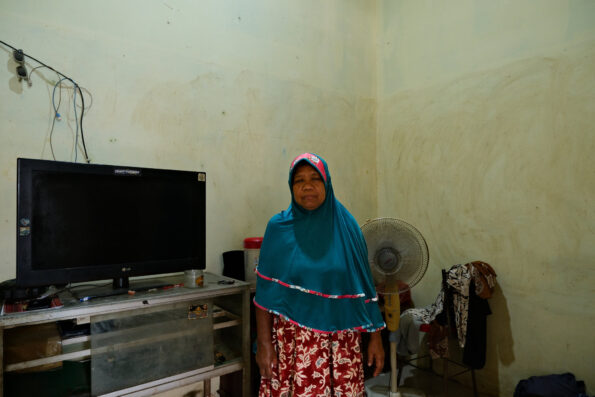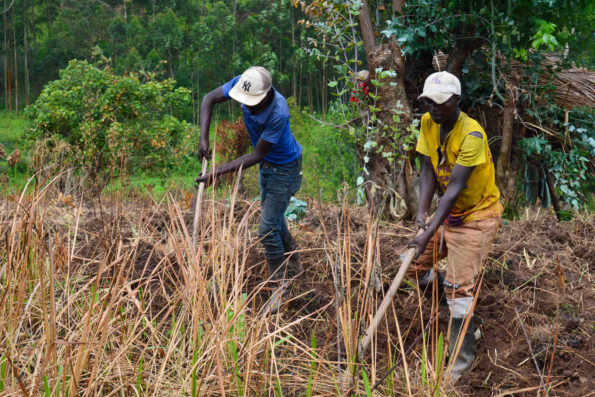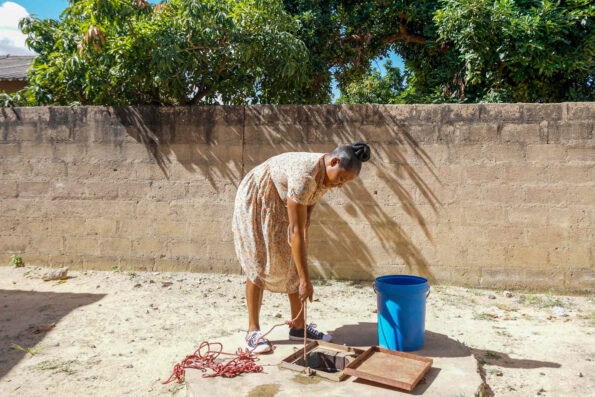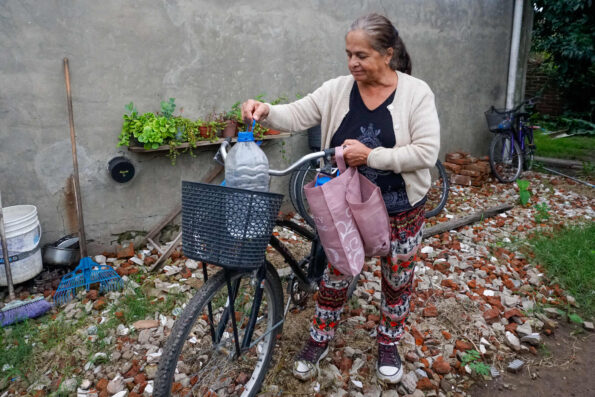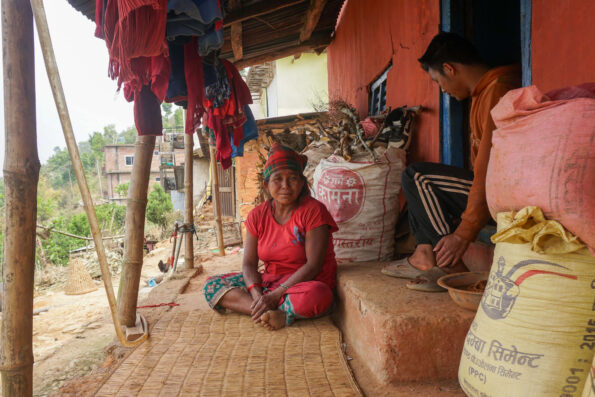
Poongulaly Balagobalan, GPJ Sri Lanka
Pandaram Thirupparansothi inspects the banana leaves on his farm in Neervely, Sri Lanka. He can earn as much as $44 per day selling the leaves to people who use them as wrappers to reduce plastic waste.
POINT PEDRO, SRI LANKA — When Kananathan Reka invites a visitor into her home, the first sound heard may not come from the infant on her hip. In one of the two small rooms of her home made of cement, wooden sticks and particle board sits a sewing machine, which makes a loud whirring noise.
Smiling with pride, Reka explains that this machine has transformed her family’s fortunes. She and her husband Kananathan produce cloth shopping bags to replace the single-use plastic bags prevalent in their village of Thambasitty in Point Pedro, Jaffna.
The Kananathans used to live on a monthly salary of 15,000 Sri Lankan rupees ($83) — barely enough to meet their expenses. But in less than a year, Reka says, “I can see a light approaching me little by little in my life because of this machine. Initially we found it difficult to have meals three times a day. Now we can have at least a square meal.”
Their entrepreneurial venture not only benefits them, it also is part of a growing global trend of recycling and other choices aimed at environmental sustainability in response to plastic waste that overflows landfills and chokes sea creatures and land animals.
Global awareness of the threat posed by plastic waste is expanding. The problem is a big one. The 2018 UN Environment Report found that 1 million plastic water bottles are purchased every minute, and 5 trillion disposable plastic bags are used each year.



The timing of the Kananathans’ venture was good, because on Sept. 1, 2017 the use of plastic containers, plates, cups and spoons was banned in Sri Lanka. Even plastic for banners and decorations during religious and political ceremonies has been strictly limited, though officials have not noticed a significant reduction.
Reka says her husband got their project started. Velayutham knew his wife was interested in sewing and encouraged her to take lessons. She eventually pawned some of her jewelry to purchase a Singer sewing machine. Soon, she was using the machine to make cloth shopping bags at the suggestion of her husband, who saw the project as a way to help consumers reduce the use of plastic bags.
The couple’s small business now receives orders for at least 300 bags each month, and more during holidays and ceremonies at local temples.
The bags are just one way concerned Sri Lankans are acting to address plastic waste in their communities — and, in some cases, seeing an economic as well as an environmental boost.
In 2018, a group of concerned residents formed the Plastic Zero Forum to educate residents about polyethylene use. The group has grown from 10 members to more than 60 and its Facebook page has over 1,000 “likes,” says Kandasamy Rakulan, a founding member.
Rakulan says the group grew out of informal conversations about plastic waste. “But when we see that some are participating voluntarily in the activities organized by us, we are motivated immensely,” he says.
Rakulan says his group shares data from the National Aquatic Resources Research and Development Agency about the amount of plastic waste pulled from the Gulf of Mannar in northwestern Sri Lanka. The northwestern region is more highly polluted with microplastics than any other region in the country, according to a 2018 study.
Plastic Zero Forum has used social media to mobilize followers for multiple beach cleanups. The group also encourages shop owners to offer cloth bags to customers, and it promotes other sustainable ways to reduce waste — such as using banana leaves as wrapping and packing material.
Banana leaves were once considered only good for use as fertilizer, but local farmers like Pandaram Thirupparansothi are benefitting from the new use as packing material. “Earlier I used to sell bunches of bananas. But now, more people are asking for banana leaves,” Thirupparansothi says. The farmer says he can earn as much as 5,000 rupees ($27.50) to 8,000 rupees ($44) per day from the leaves alone. “I have 4,000 banana plants. My main objective is to increase their numbers.”



Increased use of banana leaves to replace plastic packaging could help ease myriad environmental problems seen in Sri Lanka, says Ananthini Nanthakumaran, a senior lecturer in the Department of Bio Science at Jaffna University.
“Non-perishable waste triggers immense agricultural problems,” Nanthakumaran says. “Waste that is not properly recycled and buried in agricultural lands does not disintegrate and can block boreholes that are used to pumped water to crops.”
Plastic waste also is a threat to animals, adds Nanthakumaran, pointing to the recent death of a cow that had swallowed polyethylene remnants, which then blocked the animal’s digestive system.
Members of the Plastic Zero Forum say they will continue to spread the word about the dangers of plastic waste.
“We are planning to expand the awareness campaigns to each local government area in the future,” Rakulan says. “Also, we are planning to announce numerous competitions among the public to stir their interest.”
Josephine Anthony, GPJ, translated this article from Tamil.


